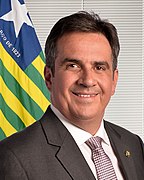Cidadania is a Brazilian political party. It was originally founded as the Popular Socialist Party by members of the former Brazilian Communist Party (PCB), as a centre-left social democratic and democratic socialist party. Despite its left-wing alignment, PPS moved to be opposition against the Workers' Party since 2004, forming alliances with centre-right parties, in particular the Brazilian Social Democracy Party (PSDB), and supporting the Impeachment of Dilma Rousseff. Later the party's National Convention adopted the new naming in March 2019, and it was later approved by the Superior Electoral Court that September. The party then began moving towards a more social liberal position akin to the third way.

Christian Democracy is a Christian democratic political party in Brazil. It was founded in 1995 as the Christian Social Democratic Party, and was officially registered in 1997. the party is presided by José Maria Eymael, who has competed the presidential elections six times. In 2017, it changed its name to the current one.
Agir is a political party in Brazil, established in 1985. It was founded as the Youth Party, and was renamed the National Reconstruction Party in 1989, and the Christian Labor Party in 2000. The party was renamed Agir in 2021, a change ratified by the Superior Electoral Court the following year.

The Brazilian Labour Renewal Party is a conservative Brazilian political party. It was founded in 1994 and its electoral number is 28. According to the party's official website, the PRTB's main ideology is participatory economics: "to establish an economic system based on participatory decision making as the primary economic mechanism for allocation in society".
The Brazilian municipal elections of 2012 took place on October 7 and on October 28. Over 138 million voters chose mayors, deputy mayors and city councillors for the 5,568 municipalities of Brazil. These were the first elections in which the recently registered parties Partido Pátria Livre (PPL) and Partido Social Democrático (PSD) participated; they were both recognized by the Superior Electoral Court in 2011. Political parties whose candidates wished to run for the 2012 elections had to be registered at the TSE for at least one year before the election date, while candidates also had to be affiliated to a party for the same period of time. Conventions for the selection of candidates within the parties occurred between 10 and 30 June, while the registry of candidates and alliances with the Regional Electoral Courts took place until July 5. Electoral campaign was authorized from the moment a candidacy had been registered. The free electoral program – two daily slots on free-to-air TV and radio for political advertising paid by the Electoral Justice fund – ran weekdays from 21 August until 4 October. According to the current Brazilian electoral law, the two-round system – should the leading candidate receive less than 50% +1 of the votes – is only available for cities with more than 200,000 voters. This includes all state capitals, with the exception of Boa Vista, Roraima and Palmas, Tocantins, plus 59 other municipalities. The free electoral program for the second round ran from 13 October until 26 October.

The New Party is a classical liberal, libertarian party in Brazil founded on 12 February 2011.
The Brazilian Woman's Party is a right-wing political party in Brazil which uses the number 35. Known for its non-feminist and anti-abortion stance, the party is not represented in the National Congress.
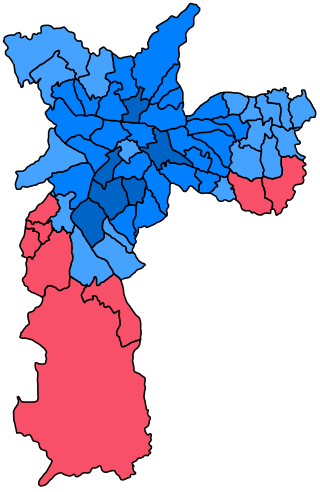
The 2020 São Paulo municipal election took place in the city of São Paulo, Brazil, with the first round taking place on 15 November 2020 and the second round taking place on 29 November 2020. Voters voted to elect the Mayor, the Vice Mayor and 55 city councillors for the administration of the city. The result was a 2nd round victory for incumbent Mayor Bruno Covas of the Brazilian Social Democratic Party (PSDB), winning 3,169,121 votes and a share of 59,38% of the popular vote, defeating political activist Guilherme Boulos of the Socialism and Liberty Party (PSOL), who took 2,168,109 votes and a share of 40.62% of the popular vote.

Municipal elections took place in Brazil on 15 November 2020. Electors chose Mayors, Vice-Mayors and City Councillors of all 5,568 cities of the country. The partisan conventions took place between 31 August and 16 September. They were the first elections since Bolsonaro's election as President.

Popular Unity, also known as Popular Unity for Socialism, is a Brazilian political party founded on 16 June 2016, which had its right to launch candidacies recognized by the Superior Electoral Court (TSE) on 10 December 2019. As a socialist party, it is connected to homeless workers' movements and defends the nationalization of the banking system, social control of all monopolies, capitalist consortia, and the means of production at-large, as well as rural land reform and collectivization.
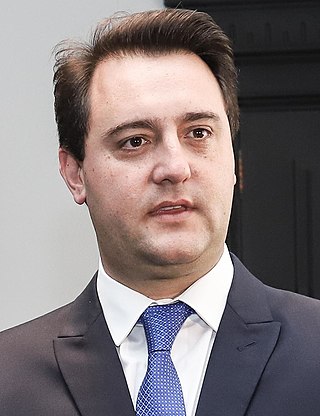
The 2022 Paraná state election took place in the state of Paraná, Brazil on 2 October 2022. Voters elected a Governor, Vice Governor, one Senator, 30 representatives for the Chamber of Deputies, and 54 Legislative Assembly members. The incumbent Governor, Ratinho Júnior, of the Social Democratic Party (PSD), was reelected in the first round with 69.64% of the votes.
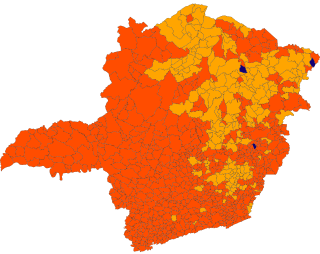
The 2022 Minas Gerais state elections took place in the state of Minas Gerais, Brazil on 2 October 2022. Voters elected a governor, vice governor, one senator, 53 representatives for the Chamber of Deputies, and 77 Legislative Assembly members. The incumbent governor, Romeu Zema, a member of the New Party, was eligible for a second term, and intended to run for reelection.
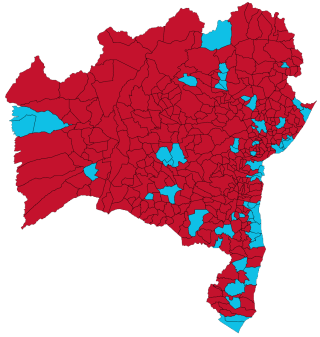
The 2022 Bahia state election took place in the state of Bahia, Brazil on 2 October 2022. The elections saw voters choose a Governor and Vice Governor, one Senator, 39 representatives for the Chamber of Deputies, and 63 Legislative Assembly members. The incumbent Governor, Rui Costa, of the Workers' Party (PT), was not eligible for a third term since he ran for governor in 2014 and 2018. In a significant upset, PT nominee and Secretary of Education Jerônimo led Mayor of Salvador ACM Neto in the first round of elections despite the vast majority of registered opinion polls indicating the leadership or even outright victory of Neto. In the end, Jerônimo obtained 49.45% of valid votes to ACM's 40.8%; less than a percentage point within of winning the election in the first round. Nevertheless, as no candidate obtained a majority of the vote, there will be a second round election on October 30 2022.
The 2024 Curitiba mayoral election took place on 6 October 2024. Voters will elect a mayor, a vice mayor, and 38 councillors. The incumbent mayor, Rafael Greca (PSD) isn't eligible for a new term, since he was elected in 2016 and reelected in 2020.

The 2024 Rio de Janeiro municipal election took place on 6 October 2024. Voters elected a mayor, vice mayor, and 51 city council members. The incumbent mayor, Eduardo Paes of the Social Democratic Party (PSD), was reelected with his second term to begin on 1 January 2025 and end on 31 December 2028.

The 2020 Curitiba municipal election took place in the city of Curitiba, Brazil, with the first round taking place on 15 November 2020. Voters elected a mayor, a vice mayor and 38 councillors who are responsible for the city administration. Their respective terms began on 1 January 2021 and will end on 31 December 2024. The incumbent mayor is Rafael Greca, a member of the former party Democrats (DEM), who was able to run for reelection.

The 2024 Fortaleza mayoral election took place on 6 October 2024. Voters elected a mayor, a vice mayor, and 43 councillors. The incumbent mayor, José Sarto, a member of the Democratic Labour Party (PDT), was elected in 2020 for his first term and intends to run for reelection.
A mayoral election in Campo Grande was held on 6 October 2024. Voters will elect a mayor, vice-mayor and 29 councilors for a four-year term.
The 2024 Porto Alegre mayoral election took place on 6 October 2024. Voters elected a mayor, a vice mayor, and 36 councillors. The incumbent mayor, Sebastião Melo, a member of the Brazilian Democratic Movement (MDB), was elected in 2020 for his first term and ran for reelection.
The 2024 Cuiabá municipal election took place in the city of Cuiabá, Brazil on 6 October 2024. Voters elected and 25 councillors. A second round was held on October 27 as no candidate achieved 50% in the first round for mayor.





